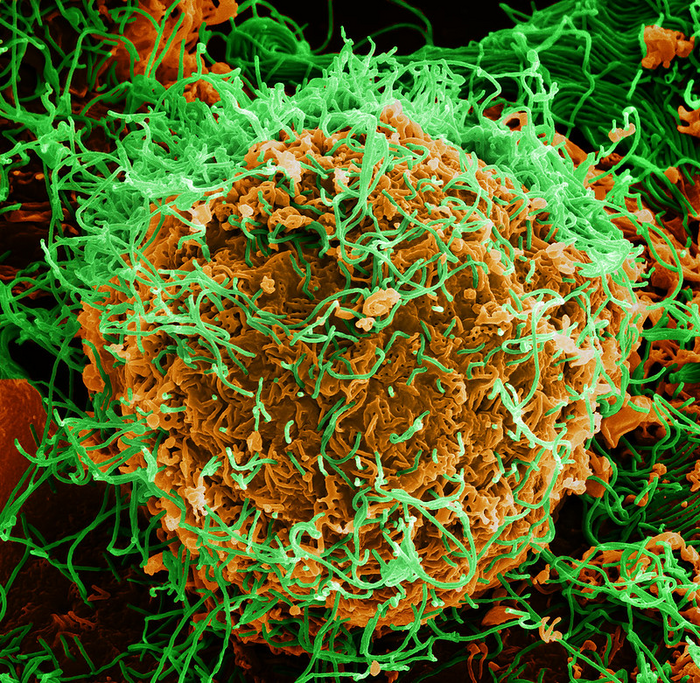WHAT:
Two randomized, placebo-controlled trials evaluating three Ebola vaccine administration strategies in adults and children found that all the regimens were safe in both age groups, according to results published today in the New England Journal of Medicine. Antibodies were produced in response to the vaccine regimens beginning at 14 days after the first vaccination and continued to be detectable at varying levels—depending on the vaccine and regimen used—in both children and adults for one year. The study enrolled volunteers at sites in Guinea, Liberia, Sierra Leone and Mali to identify optimal vaccination strategies to curtail outbreaks of Ebola virus disease.

Credit: NIAID
WHAT:
Two randomized, placebo-controlled trials evaluating three Ebola vaccine administration strategies in adults and children found that all the regimens were safe in both age groups, according to results published today in the New England Journal of Medicine. Antibodies were produced in response to the vaccine regimens beginning at 14 days after the first vaccination and continued to be detectable at varying levels—depending on the vaccine and regimen used—in both children and adults for one year. The study enrolled volunteers at sites in Guinea, Liberia, Sierra Leone and Mali to identify optimal vaccination strategies to curtail outbreaks of Ebola virus disease.
The trials were conducted under the Partnership for Research on Ebola Vaccination (PREVAC) international consortium. PREVAC’s partner organizations include the U.S. National Institutes of Health (NIH), the French National Institute of Health and Medical Research and the London School of Hygiene & Tropical Medicine. The National Institute of Allergy and Infectious Diseases (NIAID), part of NIH, sponsored the trial in Liberia and Mali. In Liberia, the study was done in collaboration with the Liberia Ministry of Health through the Partnership for Research on Ebola Virus in Liberia program. In Mali, it was conducted in collaboration with the University Clinical Research Center and the Center for Vaccine Development-Mali.
The trials began enrollment in 2017, were conducted simultaneously and shared a placebo arm. A total of 1,400 adults and 1,401 children aged 1 year to 17 years old were randomized to receive two injections of either placebo or Ebola vaccine in one of three regimens. The Ebola vaccine regimens were Ad26.ZEBOV (supplied by Johnson & Johnson) followed eight weeks later with a booster dose of MVA-BN-Filo vaccine (supplied by manufacturer Bavarian Nordic); two doses of rVSVΔG-ZEBOV-GP (manufactured by Merck Sharp & Dohme Corp) separated by eight weeks; or one dose of the Merck vaccine followed eight weeks later by a placebo injection.
Antibody responses were observed by day 14 after the first injection of either Ad26.ZEBOV or rVSVΔG-ZEBOV-GP vaccine. The researchers say this finding is notable because vaccines against Ebola virus disease are typically administered during an outbreak and so information about how rapidly a vaccine produces an antibody effect is of potential use in efforts to protect at-risk populations. However, it is not currently known what level of antibody response reliably correlates with vaccine-induced protection against Ebola virus infection or disease. As no participants contracted Ebola virus disease during the trial, the investigators were not able to assess protection from disease.
The researchers cite several strengths of the trials, including outstanding retention of volunteers throughout the course of trial, achieved with continuing community engagement and ongoing trust-building efforts.
ARTICLE:
M Kieh et al. Randomized trial of vaccines for Ebola virus disease. New England Journal of Medicine. DOI: 10.1056/NEJMoa2200072 (2022).
WHO:
H. Clifford Lane, M.D., director, Division of Clinical Research, NIAID, and member of the PREVAC study team, is available to discuss the trial findings.
CONTACT:
To schedule interviews, please contact NIAID Office of Communications, (301) 402-1663, [email protected].
Additional information about the trial can be on ClinicalTrials.gov under the identifier NCT02876328.
NIAID conducts and supports research—at NIH, throughout the United States, and worldwide—to study the causes of infectious and immune-mediated diseases, and to develop better means of preventing, diagnosing and treating these illnesses. News releases, fact sheets and other NIAID-related materials are available on the NIAID website.
About the National Institutes of Health (NIH): NIH, the nation’s medical research agency, includes 27 Institutes and Centers and is a component of the U.S. Department of Health and Human Services. NIH is the primary federal agency conducting and supporting basic, clinical, and translational medical research, and is investigating the causes, treatments, and cures for both common and rare diseases. For more information about NIH and its programs, visit http://www.nih.gov/.
NIH…Turning Discovery Into Health®
Journal
New England Journal of Medicine
DOI
10.1056/NEJMoa2200072




